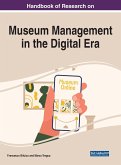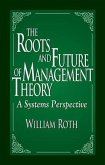Managing Service, Education and Knowledge Management in the Knowledge Economic Era
Proceedings of the Annual International Conference on Management and Technology in Knowledge, Service, Tourism & Hospitality 2016 (SERVE 2016), 8-9 October 2016 & 20-21 Oc
Herausgeber: Lumban Gaol, Ford; Hutagalung, Fonny; Filimonova, Natalia
Managing Service, Education and Knowledge Management in the Knowledge Economic Era
Proceedings of the Annual International Conference on Management and Technology in Knowledge, Service, Tourism & Hospitality 2016 (SERVE 2016), 8-9 October 2016 & 20-21 Oc
Herausgeber: Lumban Gaol, Ford; Hutagalung, Fonny; Filimonova, Natalia
- Gebundenes Buch
- Merkliste
- Auf die Merkliste
- Bewerten Bewerten
- Teilen
- Produkt teilen
- Produkterinnerung
- Produkterinnerung
Managing Service, Education and Knowledge Management in the Knowledge Economic Era contains papers presented at the 2016 International Conference on Management and Technology in Knowledge, Service, Tourism & Hospitality (SERVE 2016), covering a wide range of topics in the fields of knowledge and service management, web intelligence, tourism and hospitality. This overview of current state of affairs and anticipated developments will be of interest to researchers, entrepreneurs and students alike.
Andere Kunden interessierten sich auch für
![The Exceptional Service, Exceptional Profit The Exceptional Service, Exceptional Profit]() Leonardo InghilleriThe Exceptional Service, Exceptional Profit17,99 €
Leonardo InghilleriThe Exceptional Service, Exceptional Profit17,99 €![Handbook of Research on Museum Management in the Digital Era Handbook of Research on Museum Management in the Digital Era]() Handbook of Research on Museum Management in the Digital Era243,99 €
Handbook of Research on Museum Management in the Digital Era243,99 €![How to Improve Service, Increase Profits, & Keep Customers Happy How to Improve Service, Increase Profits, & Keep Customers Happy]() Eden RosenHow to Improve Service, Increase Profits, & Keep Customers Happy18,99 €
Eden RosenHow to Improve Service, Increase Profits, & Keep Customers Happy18,99 €![Management in the Era of Big Data Management in the Era of Big Data]() Management in the Era of Big Data125,99 €
Management in the Era of Big Data125,99 €![The Roots and Future of Management Theory The Roots and Future of Management Theory]() William RothThe Roots and Future of Management Theory167,99 €
William RothThe Roots and Future of Management Theory167,99 €![Higher Education in the Twenty-First Century II Higher Education in the Twenty-First Century II]() Higher Education in the Twenty-First Century II165,99 €
Higher Education in the Twenty-First Century II165,99 €![Global Engineering Global Engineering]() Carlos AcostaGlobal Engineering249,99 €
Carlos AcostaGlobal Engineering249,99 €-
-
-
Managing Service, Education and Knowledge Management in the Knowledge Economic Era contains papers presented at the 2016 International Conference on Management and Technology in Knowledge, Service, Tourism & Hospitality (SERVE 2016), covering a wide range of topics in the fields of knowledge and service management, web intelligence, tourism and hospitality. This overview of current state of affairs and anticipated developments will be of interest to researchers, entrepreneurs and students alike.
Produktdetails
- Produktdetails
- Verlag: CRC Press
- Seitenzahl: 238
- Erscheinungstermin: 20. Juni 2017
- Englisch
- Abmessung: 250mm x 175mm x 17mm
- Gewicht: 597g
- ISBN-13: 9781138035171
- ISBN-10: 1138035173
- Artikelnr.: 57053320
- Herstellerkennzeichnung
- Libri GmbH
- Europaallee 1
- 36244 Bad Hersfeld
- gpsr@libri.de
- Verlag: CRC Press
- Seitenzahl: 238
- Erscheinungstermin: 20. Juni 2017
- Englisch
- Abmessung: 250mm x 175mm x 17mm
- Gewicht: 597g
- ISBN-13: 9781138035171
- ISBN-10: 1138035173
- Artikelnr.: 57053320
- Herstellerkennzeichnung
- Libri GmbH
- Europaallee 1
- 36244 Bad Hersfeld
- gpsr@libri.de
Dr. Ford Lumban Gaol received his B.Sc. in Mathematics, Master of Computer Science, and his Doctorate in Computer Science from the University of Indonesia, in 1997, 2001 and 2009, respectively. He is currently Associate Professor Informatics Engineering andInformation System, Bina Nusantara University, Indonesia. He is the Vice Chair of Ph.D. Program and Research Interest Group Leader "Advance System in Computational Intelligence and Knowledge Engineering" (Intel- Sys) Bina Nusantara University. Dr. Ford is the officer of IEEE Indonesia section for International and Professional Activities. He is the Chair SERSC: Science and Engineering Research Support Society Indonesia Section. Dr. Ford was the ACM Indonesia Chapter Chair and is involved in several projects related to Technology Alignment in several multinational companies such as Astra, United Tractors, Telkom, Sony Erickson. Dr. Ford was Visiting Professor to Hong Kong University in 2011, and to the Kazan Federal University 2014-2015. Dr. Fonny Hutagalung received her B.Sc. in psychology, Master of Industrial and organizational Psychology, and Doctor in Psychology from National University of Malaysia in 1996, 2003, 2011, respectively. She is currently Head of Department of Educational Psychology and Counseling. Her research interest are Psychological testing, Cognitive abilities in Early Childhood, Human Development, etc. She also takes responsibility for the teaching and learning portfolio for the undergraduate, post graduates program. She oversees local and international undergraduate and post graduates student matters and she and her team have recently developed a comprehensive student advisory system for the faculty. Her most recent books are ' Research in Early Childhood Education (2016) and 'Introduction to Social Psychology: Perspective and Knowledge (2016). Dr. Fonny Hutagalung is also an editor for international books and a member of the Malaysian Psychological Association, International Council, and Asian Psychology Association.
Management of innovative development (on the example of tourism in the
Pskov region); Assessment of immaterial resources as an innovation tool of
long-term social and economic regional development; Development of regional
forest potential of Russia in the context of bio-economic trend; Practical
tools for the assessment of strategic risk factors of entrepreneurial
activity; The impact of human resource management on customer loyalty in
the hotel industry in Russia; Conformity assessment of concession
agreements model to parameters of investment projects in transport
infrastructure area; Instruments for the implementation of import
substitution strategy in the agro-industrial complex; Enterprise
integration in the network electronic market: Choice of the
Internet-project implementation directions; Philosophy of ancient towns'
economy development evidence from Suzdal, a Russian town; Dynamic model of
the economic and social system control; Factors determining whether
industrial parks are successful or not; Methodological solutions for the
production of a new product; State instruments choice for strategic
planning in Russian regions; Harmonization of the tax portfolio of an
organization by means of situational matrix modeling; Assessment of
business activity impact on national stock market indices; Innovative
development of a region: Growth pole approach; The methodical approach to
the assessment of regional innovation and investment processes; Development
of public-private entrepreneurship projects; Methodology of E-economy
infrastructure research; Assessment of factors influencing the quality of
human resources; Impact of industrial policy on the competiveness of
high-technology businesses; Effectiveness of innovations in the process of
complex industrial and domestic waste utilization in Vladimir region as a
source of raw materials for the modern construction sector; Values of
modern youth and state youth policy; Influence of the state support on the
development of small and medium-size entrepreneurship of the Vladimir
region; Predictive analysis of the tourism hospitality development in
Slovakia; Urban areas as educational tourism destinations; Methodological
aspects of forming a regional benchmarking partnership; Current barriers of
innovation development of Russian entrepreneurship; The role of innovations
in the modern economy and their economic essence; Problems of establishment
and development of start-ups in Russia; Rise and development of the
ecosystem of innovative entrepreneurship in Russia; Exploring the appeals
used in creative advertising: A conceptual theory; Innovative thinking as a
factor in the establishment of an innovation-based economy in Russia:
Spiritual and moral aspects; Contemporary regional planning in Russia:
Systemic problems and development issues; Employees' personal potential as
the main factor of the innovation activity of a Russian organisation;
Analysis of the current situation of the production structure of the dairy
industry of the Russian Federation regions: Optimization reserves;
Competitive differentiators of money-and-credit institutions of modern
Russia; Environmental activities in Indonesian Islamic commercial banks'
corporate social responsibility; Impact of small business sector on quality
of life in Russian regions; Model of innovation activities situation in
regions; Factors reducing a company's value in the system of internal
financial control
Pskov region); Assessment of immaterial resources as an innovation tool of
long-term social and economic regional development; Development of regional
forest potential of Russia in the context of bio-economic trend; Practical
tools for the assessment of strategic risk factors of entrepreneurial
activity; The impact of human resource management on customer loyalty in
the hotel industry in Russia; Conformity assessment of concession
agreements model to parameters of investment projects in transport
infrastructure area; Instruments for the implementation of import
substitution strategy in the agro-industrial complex; Enterprise
integration in the network electronic market: Choice of the
Internet-project implementation directions; Philosophy of ancient towns'
economy development evidence from Suzdal, a Russian town; Dynamic model of
the economic and social system control; Factors determining whether
industrial parks are successful or not; Methodological solutions for the
production of a new product; State instruments choice for strategic
planning in Russian regions; Harmonization of the tax portfolio of an
organization by means of situational matrix modeling; Assessment of
business activity impact on national stock market indices; Innovative
development of a region: Growth pole approach; The methodical approach to
the assessment of regional innovation and investment processes; Development
of public-private entrepreneurship projects; Methodology of E-economy
infrastructure research; Assessment of factors influencing the quality of
human resources; Impact of industrial policy on the competiveness of
high-technology businesses; Effectiveness of innovations in the process of
complex industrial and domestic waste utilization in Vladimir region as a
source of raw materials for the modern construction sector; Values of
modern youth and state youth policy; Influence of the state support on the
development of small and medium-size entrepreneurship of the Vladimir
region; Predictive analysis of the tourism hospitality development in
Slovakia; Urban areas as educational tourism destinations; Methodological
aspects of forming a regional benchmarking partnership; Current barriers of
innovation development of Russian entrepreneurship; The role of innovations
in the modern economy and their economic essence; Problems of establishment
and development of start-ups in Russia; Rise and development of the
ecosystem of innovative entrepreneurship in Russia; Exploring the appeals
used in creative advertising: A conceptual theory; Innovative thinking as a
factor in the establishment of an innovation-based economy in Russia:
Spiritual and moral aspects; Contemporary regional planning in Russia:
Systemic problems and development issues; Employees' personal potential as
the main factor of the innovation activity of a Russian organisation;
Analysis of the current situation of the production structure of the dairy
industry of the Russian Federation regions: Optimization reserves;
Competitive differentiators of money-and-credit institutions of modern
Russia; Environmental activities in Indonesian Islamic commercial banks'
corporate social responsibility; Impact of small business sector on quality
of life in Russian regions; Model of innovation activities situation in
regions; Factors reducing a company's value in the system of internal
financial control
Management of innovative development (on the example of tourism in the
Pskov region); Assessment of immaterial resources as an innovation tool of
long-term social and economic regional development; Development of regional
forest potential of Russia in the context of bio-economic trend; Practical
tools for the assessment of strategic risk factors of entrepreneurial
activity; The impact of human resource management on customer loyalty in
the hotel industry in Russia; Conformity assessment of concession
agreements model to parameters of investment projects in transport
infrastructure area; Instruments for the implementation of import
substitution strategy in the agro-industrial complex; Enterprise
integration in the network electronic market: Choice of the
Internet-project implementation directions; Philosophy of ancient towns'
economy development evidence from Suzdal, a Russian town; Dynamic model of
the economic and social system control; Factors determining whether
industrial parks are successful or not; Methodological solutions for the
production of a new product; State instruments choice for strategic
planning in Russian regions; Harmonization of the tax portfolio of an
organization by means of situational matrix modeling; Assessment of
business activity impact on national stock market indices; Innovative
development of a region: Growth pole approach; The methodical approach to
the assessment of regional innovation and investment processes; Development
of public-private entrepreneurship projects; Methodology of E-economy
infrastructure research; Assessment of factors influencing the quality of
human resources; Impact of industrial policy on the competiveness of
high-technology businesses; Effectiveness of innovations in the process of
complex industrial and domestic waste utilization in Vladimir region as a
source of raw materials for the modern construction sector; Values of
modern youth and state youth policy; Influence of the state support on the
development of small and medium-size entrepreneurship of the Vladimir
region; Predictive analysis of the tourism hospitality development in
Slovakia; Urban areas as educational tourism destinations; Methodological
aspects of forming a regional benchmarking partnership; Current barriers of
innovation development of Russian entrepreneurship; The role of innovations
in the modern economy and their economic essence; Problems of establishment
and development of start-ups in Russia; Rise and development of the
ecosystem of innovative entrepreneurship in Russia; Exploring the appeals
used in creative advertising: A conceptual theory; Innovative thinking as a
factor in the establishment of an innovation-based economy in Russia:
Spiritual and moral aspects; Contemporary regional planning in Russia:
Systemic problems and development issues; Employees' personal potential as
the main factor of the innovation activity of a Russian organisation;
Analysis of the current situation of the production structure of the dairy
industry of the Russian Federation regions: Optimization reserves;
Competitive differentiators of money-and-credit institutions of modern
Russia; Environmental activities in Indonesian Islamic commercial banks'
corporate social responsibility; Impact of small business sector on quality
of life in Russian regions; Model of innovation activities situation in
regions; Factors reducing a company's value in the system of internal
financial control
Pskov region); Assessment of immaterial resources as an innovation tool of
long-term social and economic regional development; Development of regional
forest potential of Russia in the context of bio-economic trend; Practical
tools for the assessment of strategic risk factors of entrepreneurial
activity; The impact of human resource management on customer loyalty in
the hotel industry in Russia; Conformity assessment of concession
agreements model to parameters of investment projects in transport
infrastructure area; Instruments for the implementation of import
substitution strategy in the agro-industrial complex; Enterprise
integration in the network electronic market: Choice of the
Internet-project implementation directions; Philosophy of ancient towns'
economy development evidence from Suzdal, a Russian town; Dynamic model of
the economic and social system control; Factors determining whether
industrial parks are successful or not; Methodological solutions for the
production of a new product; State instruments choice for strategic
planning in Russian regions; Harmonization of the tax portfolio of an
organization by means of situational matrix modeling; Assessment of
business activity impact on national stock market indices; Innovative
development of a region: Growth pole approach; The methodical approach to
the assessment of regional innovation and investment processes; Development
of public-private entrepreneurship projects; Methodology of E-economy
infrastructure research; Assessment of factors influencing the quality of
human resources; Impact of industrial policy on the competiveness of
high-technology businesses; Effectiveness of innovations in the process of
complex industrial and domestic waste utilization in Vladimir region as a
source of raw materials for the modern construction sector; Values of
modern youth and state youth policy; Influence of the state support on the
development of small and medium-size entrepreneurship of the Vladimir
region; Predictive analysis of the tourism hospitality development in
Slovakia; Urban areas as educational tourism destinations; Methodological
aspects of forming a regional benchmarking partnership; Current barriers of
innovation development of Russian entrepreneurship; The role of innovations
in the modern economy and their economic essence; Problems of establishment
and development of start-ups in Russia; Rise and development of the
ecosystem of innovative entrepreneurship in Russia; Exploring the appeals
used in creative advertising: A conceptual theory; Innovative thinking as a
factor in the establishment of an innovation-based economy in Russia:
Spiritual and moral aspects; Contemporary regional planning in Russia:
Systemic problems and development issues; Employees' personal potential as
the main factor of the innovation activity of a Russian organisation;
Analysis of the current situation of the production structure of the dairy
industry of the Russian Federation regions: Optimization reserves;
Competitive differentiators of money-and-credit institutions of modern
Russia; Environmental activities in Indonesian Islamic commercial banks'
corporate social responsibility; Impact of small business sector on quality
of life in Russian regions; Model of innovation activities situation in
regions; Factors reducing a company's value in the system of internal
financial control








